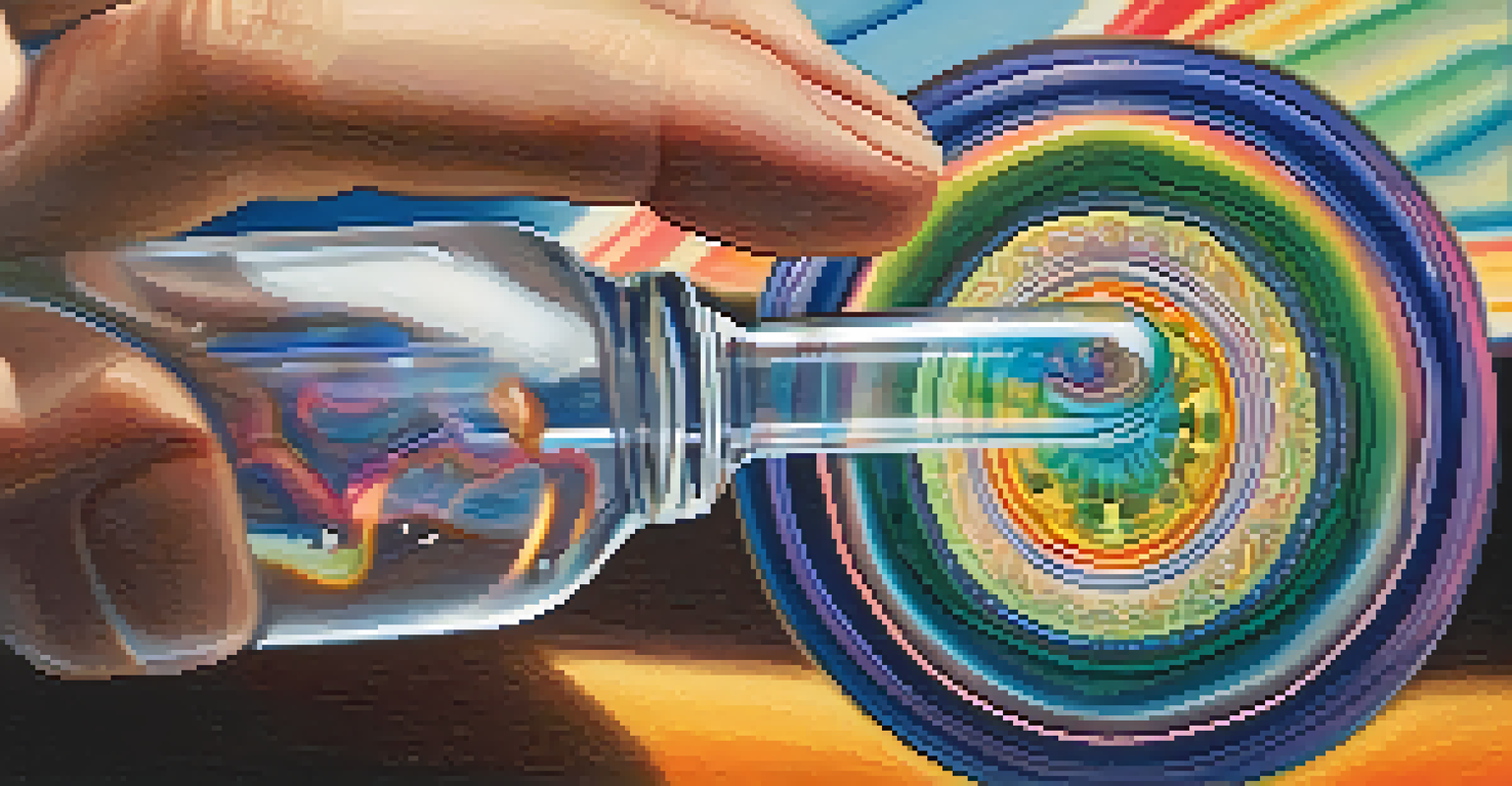Alleviating Existential Distress with Psychedelics in Care

Understanding Existential Distress and Its Impact
Existential distress refers to the profound anxiety and discomfort regarding life's meaning and one's own existence. It can emerge during critical life events, such as terminal illness or major life transitions, leading to feelings of despair and isolation. This type of distress often affects mental health, making it difficult for individuals to cope with their circumstances.
The greatest discovery of my generation is that human beings can alter their lives by altering their attitudes of mind.
Many people facing existential distress feel a sense of helplessness, as traditional treatments might not adequately address their emotional and psychological pain. This is where innovative approaches, such as the use of psychedelics, come into play. These substances are being researched for their potential to facilitate profound personal insights and emotional healing.
Understanding the nature of existential distress is crucial in exploring new therapeutic avenues. By recognizing the depth of this experience, caregivers can better support individuals seeking relief from their emotional turmoil. This sets the stage for examining how psychedelics might serve as a valuable tool in care settings.
The Science Behind Psychedelics and Mental Health
Psychedelics, such as psilocybin and LSD, are gaining attention in the field of mental health for their ability to alter consciousness and perception. Research shows that these substances can foster new neural connections, potentially leading to transformative experiences. This neuroplasticity is particularly beneficial for those grappling with existential distress, as it opens up avenues for new perspectives on life and death.

Studies have indicated that psychedelics can reduce symptoms of anxiety and depression, especially in terminally ill patients. These substances may encourage individuals to confront their fears and find meaning in their experiences. The therapeutic settings in which psychedelics are administered play a significant role in moderating their impact, emphasizing the importance of guided experiences.
Existential Distress Affects Well-Being
Existential distress, often triggered by significant life events, can lead to profound anxiety and mental health challenges.
Understanding the science behind psychedelics can help demystify their effects and pave the way for integrating them into care practices. When used thoughtfully and ethically, these substances could become vital tools for alleviating the heavy weight of existential distress.
Creating Safe and Supportive Environments for Use
Administering psychedelics in a care context requires a carefully curated environment to ensure safety and comfort. This includes having trained professionals on hand to guide the experience and provide emotional support throughout the process. A calm, nurturing space can significantly enhance the therapeutic effects of psychedelics.
We do not see things as they are, we see them as we are.
In addition to physical safety, emotional and psychological readiness are crucial for individuals considering psychedelic therapy. Pre-session counseling can help participants articulate their intentions and prepare for the potential challenges of the experience. This preparation fosters a sense of trust and openness, which is essential for the therapeutic process.
By prioritizing a supportive environment, care providers can enhance the effectiveness of psychedelic treatments. This not only helps individuals feel more secure but also encourages a deeper exploration of their existential concerns.
The Role of Integration After Psychedelic Experiences
Integration refers to the process of making sense of and incorporating insights gained from psychedelic experiences into daily life. This step is vital for individuals to fully benefit from their journeys, particularly when addressing existential distress. Without proper integration, profound experiences might remain fleeting and unanchored.
Caregivers can assist individuals in this integration phase by offering ongoing support and resources. This might include group therapy sessions, individual counseling, or creative outlets that allow personal reflection. By fostering an environment where participants can discuss and explore their insights, caregivers help reinforce the therapeutic value of the experience.
Psychedelics as Therapeutic Tools
Research indicates that psychedelics can facilitate transformative experiences that help individuals confront their fears and find meaning in their lives.
Effective integration can lead to lasting changes in perspective, helping individuals find renewed meaning and purpose in their lives. This underscores the importance of a holistic approach to psychedelic therapy, where integration plays a crucial role in transforming distress into a pathway for healing.
Ethical Considerations in Psychedelic Therapy
As with any emerging treatment, ethical considerations are paramount when using psychedelics in care settings. The potential for misuse or misunderstanding of these substances calls for strict guidelines and oversight. Care providers must navigate the fine line between facilitating therapeutic experiences and ensuring patient safety.
Informed consent is another critical aspect of ethical practice. Individuals must fully understand the risks, benefits, and uncertainties associated with psychedelic therapy. This empowers them to make informed decisions about their treatment and fosters a sense of agency over their healing journey.
By prioritizing ethical standards, caregivers can help ensure that psychedelic therapy is conducted responsibly and respectfully. This builds trust and reinforces the integrity of the therapeutic process, ultimately benefiting those seeking relief from existential distress.
Personal Stories: Transformative Experiences with Psychedelics
Personal narratives can be incredibly powerful in illustrating the potential of psychedelics to alleviate existential distress. Many individuals report profound shifts in their understanding of life and death after guided psychedelic experiences. These stories often highlight feelings of connection, love, and acceptance, which can dramatically alter one’s perspective.
For instance, a terminally ill patient may recount how a psychedelic experience helped them reconcile their fears about dying. This not only brought them peace but also allowed them to communicate openly with loved ones. Such testimonials underscore the transformative potential of these substances when used in a supportive therapeutic setting.
Integration is Key for Healing
Proper integration of insights gained from psychedelic experiences is essential for individuals to achieve lasting changes and renewed purpose.
Sharing these personal stories can inspire hope and encourage others to explore psychedelic therapy. They serve as a reminder of the resilience of the human spirit and the potential for healing that lies within even the most challenging journeys.
The Future of Psychedelics in Care and Healing
The future of psychedelics in clinical settings looks promising as research continues to expand. With growing interest from the scientific community and increased funding for studies, the potential therapeutic applications of these substances may soon become more mainstream. This shift could lead to more comprehensive treatment options for individuals experiencing existential distress.
As societal perceptions of psychedelics evolve, it’s crucial for care providers to stay informed about the latest findings and best practices. Continued education and training will be essential to safely and effectively integrate these substances into care. This proactive approach can help ensure that the benefits of psychedelics are realized while minimizing risks.

Ultimately, the future of psychedelics in healing is about harnessing their potential to foster connection, understanding, and peace. By embracing this frontier, we can create pathways for individuals to navigate their existential distress and emerge with renewed hope and clarity.